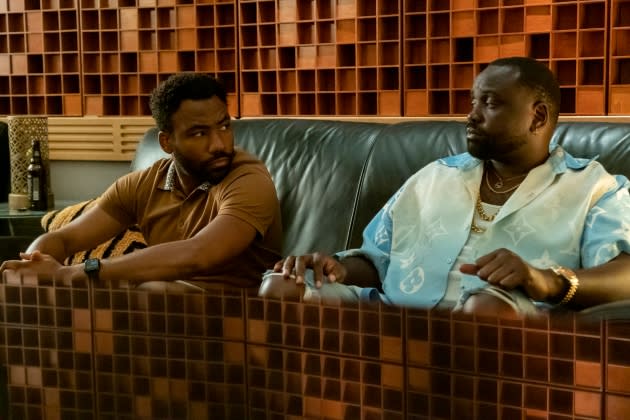‘Atlanta:’ How Japanese Breakfast and Gil Scott-Heron Were Woven Into Show’s Rap-Centric World

A show about a down-on-his-luck college dropout and his rapper cousin navigating the music industry as the latter’s star rises; created by a multi-hyphenate who, at one point, was a full-time rapper himself; set in what many might argue was the rap capital of the United States for most of the past decade…
You’d think Donald Glover’s FX series “Atlanta” would be a cakewalk for song placements — license a few Migos, Young Thug and Gucci Mane tracks and call it a day — but music supervisors Jen Malone and Fam Udeorji are anything but paint-by-numbers.
More from Variety
A Fresh Take on 'Marie-Antoinette': On Set of the Dazzling New Costume Drama
'The English' Star Chaske Spencer on Joining the Western Comeback Trend: We Live in the 'Wild West'
That Sauron Reveal on 'The Rings of Power' Finale Explained by [SPOILER], Plus a Preview of Season 2
While musically, the series pays ample homage to its titular hometown, the pair has worked closely with Glover and the rest of the show’s writers room throughout its four-season run — coming to an end in November — to establish a musical palette that simultaneously reflects Atlanta while also expanding far beyond the city limits.
“With the show being rooted in music, there’s one side of that with the writers, Donald and their Atlanta sensibilities, but also being mindful to not lean too heavy on what people’s ideas of what Atlanta is,” Udeorji tells Variety. “We’ve developed this sort of spectrum that has since become streamlined, so you can have everything from Kodak Black to Beach House and have it work seamlessly.”
Curation goes hand-in-hand with character, Udeorji and Malone explain. For instance, in an early season-one scene, Glover’s Earn lays on a couch, staring down the barrel of a revolver pistol while indie darlings Beach House’s “Space Song” blares through his headphones. His character’s sensibility and fondness for indie music carries over into the show’s final season, when viewers hear about five seconds of Japanese Breakfast’s “Kokomo, IN” in his car before a phone call from Brian Tyree Henry’s Alfred interrupts the track.
“Our decisions were mostly about not having set expectations of what these characters listen to, and the song choices also aim to mirror where the characters are at in the story,” Malone says.
The two share that their close collaboration with Glover, director Hiro Murai and the show’s writers, including brother Stephen Glover, Stefani Robinson, Jamal Olori and others, means many of the licensed tracks that end up in the series were initially ideas born out of writers room. While Malone is a tenured music supervisor in her own right, serving the same role on shows like “Euphoria” and “Yellowjackets,” Udeorji came into the role throughout “Atlanta’s” run, having previously been attached to Glover’s creative circle. This collaborative partnership — along with the diverse musical palettes of the show’s creatives — has made the music of the series more of its own character than an afterthought.
A recent example of this cohesion comes at the end of the final season’s fourth episode titled “Light Skinned-ed,” in which its subplot chronicles a day at the mall with Earn’s father, Raleigh Marks (played by Isiah Whitlock Jr.). What is meant to be a relaxing Sunday for Raleigh ends as one of shame, with the elderly father facing ridicule from a group of insensitive teenagers for his wardrobe choices, particularly a new hat he purchased from a pursuasive saleswoman. Seething from the day’s events at a family dinner, Raleigh lashes out at a young waiter, ending the episode on the most fitting of needle drops: “Save the Children” by Gil Scott-Heron.
“The writers are so connected to the characters and the storyline, as are the editors and Hiro, and there are specific choices that they will give to us that they want to tell the story of each episode,” Malone says. “[For ‘Save the Children,’] once we got in the room and saw where everything was at, it was just a feeling of, ‘Well, there’s obviously no beating this one.’ So we went and negotiated the rights.”
When the show does license Atlanta hip-hop songs, the decisions tend to be made with a precise pulse on the current regional scene. The title card drop of the final season’s second episode, “The Homeliest Little Horse,” features the Young Stoner Life track “Warrior” with its selected portion prominently highlighting rapper Lil Keed, who died in May at the age of 24. It made the decision to use his music feel like an Atlantean tribute to the late rapper.
Says Udeorji: “One big question in the [writer’s room] that’s often discussed is, ‘How can we represent Atlanta for the people in Atlanta?’ People like Jo Swank, Jamal Olori and Stephen Glover are big on representing Atlanta to the fullest through the music.”
And what of the end? Malone and Udeorji are wistful and proud. “It’s been incredibly fulfilling on every single level,” says Malone. “It has basically been the same team from day one, and I’m just so grateful to be able to work on a show that really took TV to another level.”
“In the last four years or so, I’d see new shows describe themselves as an ‘Atlanta’-type show,” Udeorji adds. “Regardless of how polarizing the show has been throughout its run, I think it has influenced a lot of current television.”
Best of Variety
The Best Pop Culture Halloween Costumes for 2022: From 'House of the Dragon' to 'Euphoria'
Constance Wu Gets Candid in Revealing New Memoir 'Making a Scene'
Sign up for Variety’s Newsletter. For the latest news, follow us on Facebook, Twitter, and Instagram.

